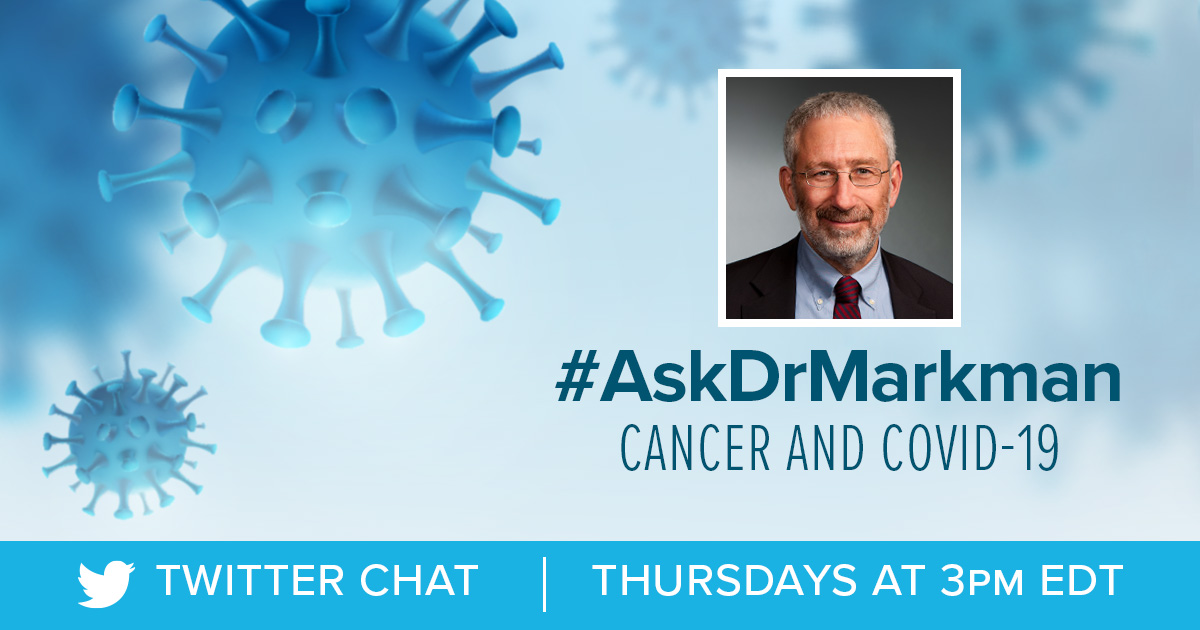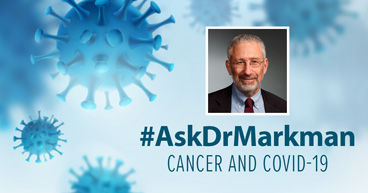
The COVID-19 pandemic has created a constantly evolving flow of new and sometimes confusing information. Cancer patients have many questions about how the virus may affect them, their access to ongoing treatments, their overall health and steps they can take to help reduce risk of infection. Maurie Markman, MD, President of Medicine & Science at Cancer Treatment Centers of America® (CTCA), has launched a weekly Q&A hosted on Twitter to answer your questions, in real time and as questions are sent to us online and by phone. Follow us on #AskDrMarkman. Here’s this week’s chat:
Question: I have friend being treated for cancer who says she would be afraid to go to the hospital if she needs emergency care for some reason. Is this a common concern?
Answer: Yes, there is unfortunately rather solid evidence that individuals who may need to go to the hospital due to an emergency situation are delaying seeking potentially critical medical attention. In fact, one recent study revealed that hospital emergency visits had decreased by 42 percent during the early days of the COVID-19 pandemic in the United States.
Q: Are those fears valid?
A: If someone has a condition or symptom requiring emergency evaluation, it is almost certainly a better course of action to be seen by a health care professional than to fail to do so because of concern for COVID-19 infection.
Q: I am being treated for prostate cancer and take medication for high blood pressure. Do I have a greater risk of having a serious problem if I get COVID-19?
A: This is an important question. In the early days of the pandemic, there were concerns expressed that taking common blood pressure medications might increase the risk of complications. However, a recent report has revealed that while hypertension itself is a risk factor for complications, taking any type of medication to control blood pressure actually significantly reduces the risk of death from COVID-19 compared to not taking any medication.
Q: I am undergoing treatment for breast cancer and have two young children younger than 6 years old. Am I at risk of having my children spread COVID-19 to me?
A: This is a very understandable concern for many patients undergoing cancer treatment and those who may do so soon. But a recent Dutch study following more than 50 families found that children under 12 years old played very little roles in transmitting COVID-19.
Q: I am a cancer survivor and am interested in receiving the COVID-19 vaccine when it’s available. Do we know what percentage of the U.S. population will be willing to get vaccinated?
A: This is an important issue because the only way vaccines will be effective is if the majority of individuals not previously exposed to the virus are willing to get vaccinated. Fortunately, a recent survey of 1,000 adult Americans found that 70 percent said they’d be willing to undergo vaccination when a safe and effective vaccine is available.
Q: Why would some people choose not to get the vaccine?
A: Without question, vaccination will be the single most important factor in substantially reducing the remarkably severe health and economic impact of this viral pandemic. A recent report has suggested that, while the majority of Americans support vaccination, individuals who state they are worried about the seriousness of COVID-19 are far more willing to be vaccinated compared to those who say they are not worried.
Q: I am a 15-year cancer survivor, and today I am more worried about COVID-19 than my cancer returning. I am especially worried that the virus continues to mutate into a more dangerous threat. Is that a valid concern?
A: Your concern is natural and very understandable. Clearly, it will take time to provide a definitive answer to your question. However, a recent report from the World Health Organization (WHO) found that there’s been very little change in the basic molecular structure of the virus over time and in multiple locations, suggesting that COVID-19 is not becoming more dangerous.
Q: I will begin cancer treatment this month, and I’m wondering: Am I at less risk for COVID-19 infection because we’re entering the warm summer season?
A: This is a reasonable question. In fact, it’s a major focus of research designed to understand the pattern of this viral infection. However, while COVID-19 has demonstrated an inability to withstand high temperatures, it’s still unclear if the infection will follow a similar seasonal pattern to that of influenza. We’ll learn more as the summer unfolds.
Q: Are we making any progress in knowing which patients are likely to suffer the most serious complications of COVID-19?
A: It is known that certain co-morbidities, such as hypertension, diabetes, cancer, heart and lung disease, in addition to being elderly, increases the risk. In addition, scientists have begun to report that certain abnormalities in the blood of COVID-19 patients may predict the severity of illness and may serve as future targets to improve outcomes.
If you’re a cancer survivor or in active treatment and are concerned about how COVID-19 may impact you or your care, please contact your care team.
Learn more about changing cancer treatment schedules during the pandemic.



